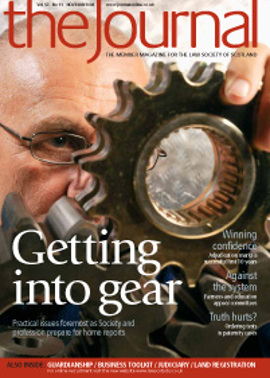Sensitive relations

The decision of the sheriff in Smith v Greenhill, upheld on appeal by the sheriff principal (1994 SLT (Sh Ct) 22; 1993 SCLR 776), and the course of the parties’ lives since the action, may be of interest for several reasons. The case raises questions such as:
Are the best interests of a child served under present legislation that does not compel a party to an action of parentage/non-parentage to provide a specimen for DNA analysis?
Should such cases be decided by applying legal presumptions and drawing inferences, when a simple non-invasive scientific procedure provides a definitive answer?
Should the welfare principle ever be considered when deciding issues of parentage and non-parentage, as in England?
Is current legislation compliant with articles 7 and 8 of the United Nations Convention on the Rights of the Child?
Inconclusive evidence
The background to the original action was that the pursuer sought a declarator of parentage in respect of a young female child, alleging he was the father of the child and seeking an award of access, as it was then. The defender denied that the pursuer was the father of the child, averring that her husband was the father.
An application under s 70 of the Law Reform (Miscellaneous Provisions) (Scotland) Act 1990 was made by the pursuer to the court, to request the defender to provide a sample of blood or similar for laboratory analysis to determine the issue of paternity.
The sheriff asked the defender to provide a sample, explaining that it was preferable that the question of paternity be resolved with scientific certainty rather than by the process of hearing oral evidence on other matters to determine whether the pursuer was indeed the father of her child.
The defender was in a continuing relationship with her husband. The court was told that she was unwilling to provide a specimen for analysis. The sheriff decided to hear the evidence before deciding what adverse inference he would draw from the defender’s refusal to provide a specimen.
The sheriff found after proof that on the evidence before the court, either the pursuer or the defender’s husband could be the father of the child (author’s emphasis). The evidence did not point conclusively to the identity of the father.
Adverse inferences
In considering the effect of the defender’s refusal to provide a specimen for analysis, the sheriff drew the inference that the pursuer could be the father of the child. However, he decided that her refusal did not overcome the presumption under s 5(1)(a) of the Law Reform (Parent and Child) (Scotland) Act 1986, that her husband was the father of the child. Section 5(1)(a) provides that a man shall be presumed to be the father of a child if he was married to the mother of the child at any time in the period beginning with the conception and ending with the birth of the child. This presumption has a common law parent, pater est quem nuptiae demonstrant, fundamental in such cases. The present statute provides that the presumption “shall” apply subject to rebuttal evidence on the balance of probabilities.
In Smith the sheriff decided that the pursuer had failed to satisfy the court that he was the father of the child from the weight to be attached to the adverse inference drawn from the defender’s refusal to provide a specimen for analysis, balanced against the s 5(1)(a) presumption.
The pursuer appealed to the sheriff principal. The basis of the appeal was that the sheriff had had been too conservative in his approach and had not gone far enough. The pursuer argued that the appropriate inference to draw from the defender’s refusal was that the pursuer was the father of the child, not just that he could be.
The sheriff principal, upholding the sheriff, found that the defender’s refusal to provide a specimen did not overcome the presumption that her husband was the father of the child, and that the only inference to be drawn was that the defender was incorrect in her evidence when she denied the possibility that the pursuer was the father. While this decision is contrary to Re G (Parentage; Blood Sample) [1997] 1 FLR 360; [1997] 2 FCR 325; [1997] Fam Law 243, it has been approved by Wilkinson & Norrie, Parent and Child as being the right approach, though in some quarters the approach of the court was thought to have been unduly conservative.
Interests of the child
Given the reliability of DNA evidence, one wonders what benefit there can be to the child in an action for parentage/non-parentage in excluding scientific evidence and relying instead on non-scientific methodology to determine issues of parentage? Shouldn’t the best evidence available be used?
Further, “the interests of justice in the abstract are best served by the ascertainment of the truth and there must be few cases where the interests of children can be shown to be best served by the suppression of truth” (S v S; W v Official Solicitor [1972] AC 24 per Lord Hodson at 57H).
However see Cameron v Carr’s Curator ad Litem 1998 SLT (Sh Ct) 22: s 70 gives the court discretion as to whether to issue a request to provide a sample at all.
It is possible that the current legislation is not compliant with the requirements of articles 7 and 8 of the UN Convention on the Rights of the Child, in that it does not compel a parent to provide a specimen for analysis. Article 7 provides: “The child… shall have the right from birth to a name, the right to acquire a nationality and, as far as possible, the right to know and be cared for by his or her parents.” Article 8 requires states parties to undertake “to respect the right of the child to preserve his or her identity, including nationality, name and family relations as recognised by law without unlawful interference”.
Professor Norrie in Parent and Child opines that these international obligations seem to preclude welfare or other considerations preventing the discovery of the truth about parentage. This appears to be consistent with Lord Hodson’s view noted above.
Professor Norrie also writes that in an action for declarator of parentage with no further conclusions, the possible outcome of scientific tests ought not to affect whether those tests should be requested.
The family setting
In Smith the pursuer sought an access order, and one might speculate whether the sheriff, consciously or subconsciously, considered the welfare principle and followed the English approach whereby tests might not be ordered if the results are likely to disturb the child’s security within the child’s present family setting with no concomitant benefit? In Smith at the date of the proof the defender was in a settled relationship with her husband, and it may have appeared to the court that the welfare interests of the child would have been best served by rejecting the pursuer’s case. Was the decision a case of making the law fit an outcome perceived as being in the best interests of the child, or was it the result of applying existing law to the dispute before the court? The author’s opinion, for what it is worth, is that the case was conventionally and correctly decided by the court.
It is perhaps unfortunate that s 70 does not provide for more compulsion when parties are reluctant to provide samples for analysis. If the interests of children come first, they are normally best served by finding the truth in matters of parentage/non-parentage. It is difficult to see why the statute falls short of requiring parties to provide specimens for analysis. Further, in those cases where a contact or other s 11 order is sought and the best interests of the child would not be served by granting such an order, the court can refuse same depending on the circumstances.
It might seem that the present situation as stated in Smith results in a situation that is arguably less than satisfactory, when parentage issues can be resolved by scientific means much preferable to the application of ancient legal presumptions.
What happened next
Perhaps if further argument was required in support of amending the statute to make provision of samples for analysis compulsory in such cases, it might be found in the subsequent developments between the parties in Smith – who are now married to each other. Following their rapprochement a DNA test was carried out and established that the pursuer is the biological father of the child. Now a young woman, she has successfully applied to the sheriff at Edinburgh for a declarator of parentage, thus permitting the Registrar of Births to change her surname on her birth certificate; and has established a relationship with her natural father.
In this issue
- Support where it's needed
- Prevention or cure?
- Gearing up for change
- A time for support
- Foreign companies and the Registers
- Sensitive relations
- New course for the courts
- Adjudication – 10 years on
- Jack's story
- Professional Practice Committee
- Sourcing our future
- Data security begins at home
- Going equipped
- Bonus round
- Nothing But Delivery
- Checking out checklists
- The final word
- Redundancy: an age old issue?
- Cohabitation update
- Inventive judging?
- Scottish Solicitors' Discipline Tribunal
- Website review
- Book reviews
- Beating the credit crunch
- Keeping a clean sheet
- Battening down in buy-to-let






